Joint Task Offloading and Resource Allocation in Mobile Edge Computing-Enabled Medical Vehicular Networks
Abstract
1. Introduction
- We formulate the problem of joint task offloading and resource allocation in MEC-enabled medical vehicular networks as a multi-objective optimization model to minimize the average task completion time and average energy consumption while satisfying resource requirements and QoS constraints.
- We design a MOEAD-based task offloading and resource allocation (IMO) algorithm to solve the problem. Furthermore, in order to obtain the optimal solution and speed up the convergence of the IMO algorithm, we develop a greedy strategy-based population initialization algorithm.
- We conduct simulation experiments for performance evaluations. Simulation experiments demonstrate that, compared to existing algorithms, the IMO algorithm can obtain smaller average task completion time, and achieve a better tradeoff between the average task completion time and average energy consumption. By measurement, the IMO algorithm can at least save 5% average task completion time.
2. Related Works
2.1. Delay Optimization
2.2. Energy Optimization
2.3. QoS Optimization
3. System Model
3.1. Network Model
3.2. Task Model
3.3. Computation and Communication Model
3.3.1. Local Computation
3.3.2. Offloading Computation
4. Problem Formulation
4.1. Optimization Objective
4.2. Constraints
5. IMO Solution
5.1. Solution Encoding
5.2. Greedy Strategy-Based Population Initialization
5.3. Reproduction Operation
| Algorithm 1 InGP algorithm |
| Input: Medical vehicular network G;
Set of tasks T; Population size ; Output: Initial solution P;
|
5.4. Overall Framework
| Algorithm 2 ExReproduct algorithm. |
| Input: Original population P;
Population size ; Crossover probability ; Mutation probability ; Output: New population ;
|
| Algorithm 3 IMO algorithm |
| Input: Medical vehicular network G;
Set of tasks T; Population size ; Neighborhood ; Weight vector ; Maximum iteration times ; Crossover probability ; Mutation probability ; Output: Solution P;
|
5.5. Complexity Analysis
6. Simulation Experiments
6.1. Simulation Setups
- LOC algorithm: All the tasks generated by the medical vehicles are processed on the local medical vehicles, rather than offloaded to the vehicular edge servers.
- OFC algorithm: All the tasks generated by the medical vehicles are offloaded to the vehicular edge servers, rather than processed locally by the medical vehicles.
- RAN algorithm: All the tasks generated by the medical vehicles are randomly processed on the local medical vehicles or offloaded to the vehicular edge servers.
- NSG algorithm: All the tasks generated by the medical vehicles are determined based on the NSGA-II algorithm to be processed on the local medical vehicles or offloaded to the vehicular edge servers.
6.2. Simulation Results
6.2.1. Convergence Evaluation
6.2.2. Effect of Number of Medical Vehicles
6.2.3. Effect of Number of Vehicular Edge Servers
6.2.4. Effect of Number of Tasks
7. Conclusions
Author Contributions
Funding
Data Availability Statement
Conflicts of Interest
References
- Fan, W.; Liu, J.; Hua, M.; Liu, Y. Joint task offloading and resource allocation for multi-access edge computing assisted by parked and moving vehicles. IEEE Trans. Veh. Technol. 2022, 71, 5314–5330. [Google Scholar] [CrossRef]
- He, Q.; Feng, Z.; Chen, Z.; Nan, T.; Li, K.; Shen, H.; Yu, K.; Wang, X. Low-cost data offloading strategy with deep reinforcement learning for smart healthcare system. IEEE Trans. Serv. Comput. 2024. [Google Scholar] [CrossRef]
- Akhlaqi, M.Y.; Hanapi, Z.B.M. Task offloading paradigm in mobile edge computing-current issues, adopted approaches, and future directions. J. Netw. Comput. Appl. 2023, 212, 103568. [Google Scholar] [CrossRef]
- Hamdi, A.M.A.; Hussain, F.K.; Hussain, O.K. Task offloading in vehicular fog computing: State-of-the-art and open issues. Future Gener. Comput. Syst. 2022, 133, 201–212. [Google Scholar] [CrossRef]
- Nan, Z.; Zhou, S.; Jia, Y.; Niu, Z. Joint task offloading and resource allocation for vehicular edge computing with result feedback delay. IEEE Trans. Wirel. Commun. 2023, 22, 6547–6561. [Google Scholar] [CrossRef]
- Qi, Y.; Zhou, Y.; Liu, Y.F.; Liu, L.; Pan, Z. Traffic-aware task offloading based on convergence of communication and sensing in vehicular edge computing. IEEE Internet Things J. 2021, 8, 17762–17777. [Google Scholar] [CrossRef]
- Yan, M.; Xiong, R.; Wang, Y.; Li, C. Edge computing task offloading optimization for a UAV-assisted Internet of vehicles via deep reinforcement learning. IEEE Trans. Veh. Technol. 2024, 73, 5647–5658. [Google Scholar] [CrossRef]
- Fan, W.; Hua, M.; Zhang, Y.; Su, Y.; Li, X.; Tang, B.; Wu, F.; Liu, Y. Game-based task offloading and resource allocation for vehicular edge computing with edge-edge cooperation. IEEE Trans. Veh. Technol. 2023, 72, 7857–7870. [Google Scholar] [CrossRef]
- Cao, D.; Wu, M.; Gu, N.; Sherratt, R.S.; Ghosh, U.; Sharma, P.K. Joint optimization of computation offloading and resource allocation considering task prioritization in ISAC-assisted vehicular network. IEEE Internet Things J. 2024, 11, 29523–29532. [Google Scholar] [CrossRef]
- Wang, S.; Li, J.; Wu, G.; Chen, H.; Sun, S. Joint optimization of task offloading and resource allocation based on differential privacy in vehicular edge computing. IEEE Trans. Comput. Soc. Syst. 2021, 9, 109–119. [Google Scholar] [CrossRef]
- Fan, W.; Su, Y.; Liu, J.; Li, S.; Huang, W.; Wu, F.; Liu, Y. Joint task offloading and resource allocation for vehicular edge computing based on V2I and V2V modes. IEEE Trans. Intell. Transp. Syst. 2023, 24, 4277–4292. [Google Scholar] [CrossRef]
- Sun, Y.; Guo, X.; Song, J.; Zhou, S.; Jiang, Z.; Liu, X. Adaptive learning-based task offloading for vehicular edge computing systems. IEEE Trans. Veh. Technol. 2019, 68, 3061–3074. [Google Scholar] [CrossRef]
- Zhang, J.; Guo, H.; Liu, J.; Zhang, Y. Task offloading in vehicular edge computing networks: A load-balancing solution. IEEE Trans. Veh. Technol. 2019, 69, 2092–2104. [Google Scholar] [CrossRef]
- Raza, S.; Liu, W.; Ahmed, M.; Anwar, M.R.; Mirza, M.R.; Sun, Q.; Wang, S. An efficient task offloading scheme in vehicular edge computing. J. Cloud Comput. 2020, 9, 28. [Google Scholar] [CrossRef]
- Liu, L.; Zhao, M.; Yu, M.; Jan, M.A.; Lan, D.; Taherkordi, A. Mobility-aware multi-hop task offloading for autonomous driving in vehicular edge computing and networks. IEEE Trans. Intell. Transp. Syst. 2022, 24, 2169–2182. [Google Scholar] [CrossRef]
- Wu, Q.; Wang, S.; Ge, H.; Fan, Q.; Letaieff, K.B. Delay-sensitive task offloading in vehicular fog computing-assisted platoons. IEEE Trans. Netw. Serv. Manag. 2024, 21, 2012–2026. [Google Scholar] [CrossRef]
- Yin, L.; Luo, J.; Qiu, C.; Wang, C.; Qiao, Y. Joint task offloading and resources allocation for hybrid vehicle edge computing systems. IEEE Trans. Intell. Transp. Syst. 2024, 25, 10355–10368. [Google Scholar] [CrossRef]
- Qin, P.; Fu, Y.; Tang, G.; Zhao, X.; Geng, S. Learning based energy efficient task offloading for vehicular collaborative edge computing. IEEE Trans. Veh. Technol. 2022, 71, 8398–8413. [Google Scholar] [CrossRef]
- Tan, K.; Feng, L.; Dán, G.; Törngren, M. Decentralized convex optimization for joint task offloading and resource allocation of vehicular edge computing systems. IEEE Trans. Veh. Technol. 2022, 71, 13226–13241. [Google Scholar] [CrossRef]
- Dai, X.; Xiao, Z.; Jiang, H.; Liu, J.C.S. UAV-assisted task offloading in vehicular edge computing networks. IEEE Trans. Mob. Comput. 2023, 23, 2520–2534. [Google Scholar] [CrossRef]
- Zhao, L.; Zhang, E.; Wan, S.; Hawbani, A.; AI-dubai, A.Y.; Min, G. MESON: A mobility-aware dependent task offloading scheme for urban vehicular edge computing. IEEE Trans. Mob. Comput. 2023, 23, 4259–4272. [Google Scholar] [CrossRef]
- Cao, B.; Li, Z.; Liu, X.; Lv, Z.; He, H. Mobility-aware multiobjective task offloading for vehicular edge computing in digital twin environment. IEEE J. Sel. Areas Commun. 2023, 41, 3046–3055. [Google Scholar] [CrossRef]
- Chen, Y.; Zhao, F.; Chen, X.; Wu, Y. Efficient multi-vehicle task offloading for mobile edge computing in 6G networks. IEEE Trans. Veh. Technol. 2021, 71, 4584–4595. [Google Scholar] [CrossRef]
- Xue, J.; Hu, Q.; An, Y.; Wang, L. Joint task offloading and resource allocation in vehicle-assisted multi-access edge computing. Comput. Commun. 2021, 177, 77–85. [Google Scholar] [CrossRef]
- Sun, Y.; Wu, Z.; Meng, K.; Zheng, Y. Vehicular task offloading and job scheduling method based on cloud-edge computing. IEEE Trans. Intell. Transp. Syst. 2023, 24, 14651–14662. [Google Scholar] [CrossRef]
- Bute, M.S.; Fan, P.; Zhang, L.; Abbas, F. An efficient distributed task offloading scheme for vehicular edge computing networks. IEEE Trans. Veh. Technol. 2021, 70, 13149–13161. [Google Scholar] [CrossRef]
- Guo, H.; Liu, J.; Ren, J.; Zhang, Y. Intelligent task offloading in vehicular edge computing networks. IEEE Wirel. Commun. 2020, 27, 126–132. [Google Scholar] [CrossRef]
- Li, Z.; Yang, C.; Huang, X.; Zeng, W.; Xie, S. CoOR: Collaborative task offloading and service caching replacement for vehicular edge computing networks. IEEE Trans. Veh. Technol. 2023, 72, 9676–9681. [Google Scholar] [CrossRef]
- Wei, Z.; Li, B.; Zhang, R.; Cheng, X.; Yang, L. Many-to-many task offloading in vehicular fog computing: A multi-agent deep reinforcement learning approach. IEEE Trans. Mob. Comput. 2023, 23, 2107–2122. [Google Scholar] [CrossRef]
- Gao, H.; Wang, X.; Wei, W.; AI-Dulaimi, A.; Xu, Y. Com-DDPG: Task offloading based on multiagent reinforcement learning for information-communication-enhanced mobile edge computing in the internet of vehicles. IEEE Trans. Veh. Technol. 2024, 73, 348–361. [Google Scholar] [CrossRef]
- Xu, X.; Liu, K.; Dai, P.; Jin, F.; Ren, H.; Zhan, C.; Guo, S. Joint task offloading and resource optimization in noma-based vehicular edge computing: A game-theoretic DRL approach. J. Syst. Archit. 2023, 134, 102780. [Google Scholar] [CrossRef]
- Wu, Q.; Wang, W.; Fan, P.; Fan, Q.; Zhu, H.; Letaief, K.B. Cooperative edge caching based on elastic federated and multi-agent deep re-inforcement learning in next-generation networks. IEEE Trans. Netw. Serv. Manag. 2024, 21, 4179–4196. [Google Scholar] [CrossRef]
- Zhou, Z.; Wang, Z.; Yu, H.; Liao, H.; Mumtaz, S.; Oliveira, L. Learning-based URLLC-aware task offloading for internet of health things. IEEE J. Sel. Areas Commun. 2020, 39, 396–410. [Google Scholar] [CrossRef]
- Dong, C.; Sun, Y.; Shafiq, M.; Hu, N.; Liu, Y.; Tian, Z. Optimizing mobility-aware task offloading in smart healthcare for internet of medical things through multi-agent reinforcement learning. IEEE Internet Things J. 2024, 11, 13677–13691. [Google Scholar] [CrossRef]
- Ren, J.; Li, J.; Liu, H.; Qin, T. Task offloading strategy with emergency handling and blockchain security in SDN-empowered and fog-assisted healthcare IoT. Tsinghua Sci. Technol. 2021, 27, 760–776. [Google Scholar] [CrossRef]
- He, Q.; Feng, Z.; Fang, H.; Wang, X.; Zhao, L.; Yao, Y. A blockchain-based scheme for secure data offloading in healthcare with deep reinforcement learning. IEEE/ACM Trans. Netw. 2023, 32, 65–80. [Google Scholar] [CrossRef]
- Wang, Y.; Wu, H.; Jhaveri, R.H.; Djenouri, Y. DRL-based URLLC-constraint and energy-efficient task offloading for Internet of Health Things. IEEE J. Biomed. Health Inform. 2024, 28, 3305–3316. [Google Scholar] [CrossRef] [PubMed]
- Ren, J.; Qin, T. Decentralized blockchain-based and trust-aware task offloading strategy for Healthcare IoT. IEEE Internet Things J. 2023, 11, 829–847. [Google Scholar] [CrossRef]
- Gao, J.; Xu, X.; Qi, L.; Dou, W.; Xia, X.; Zhou, X. Distributed computation offloading and power control for UAV-enabled internet of medical things. ACM Trans. Internet Technol. 2024. [Google Scholar] [CrossRef]
- Wang, X.; Zhao, Y.; Tang, L.; Yao, X. MOEA/D with Spatial-Temporal Topological Tensor Prediction for Evolutionary Dynamic Multiobjective Optimization. IEEE Trans. Evol. Comput. 2024. [Google Scholar] [CrossRef]
- Mousavi, S.; Mood, S.E.; Souri, A.; Javidi, M.M. Directed search: A new operator in NSGA-II for task scheduling in IoT based on cloud-fog computing. IEEE Trans. Cloud Comput. 2022, 11, 2144–2157. [Google Scholar] [CrossRef]
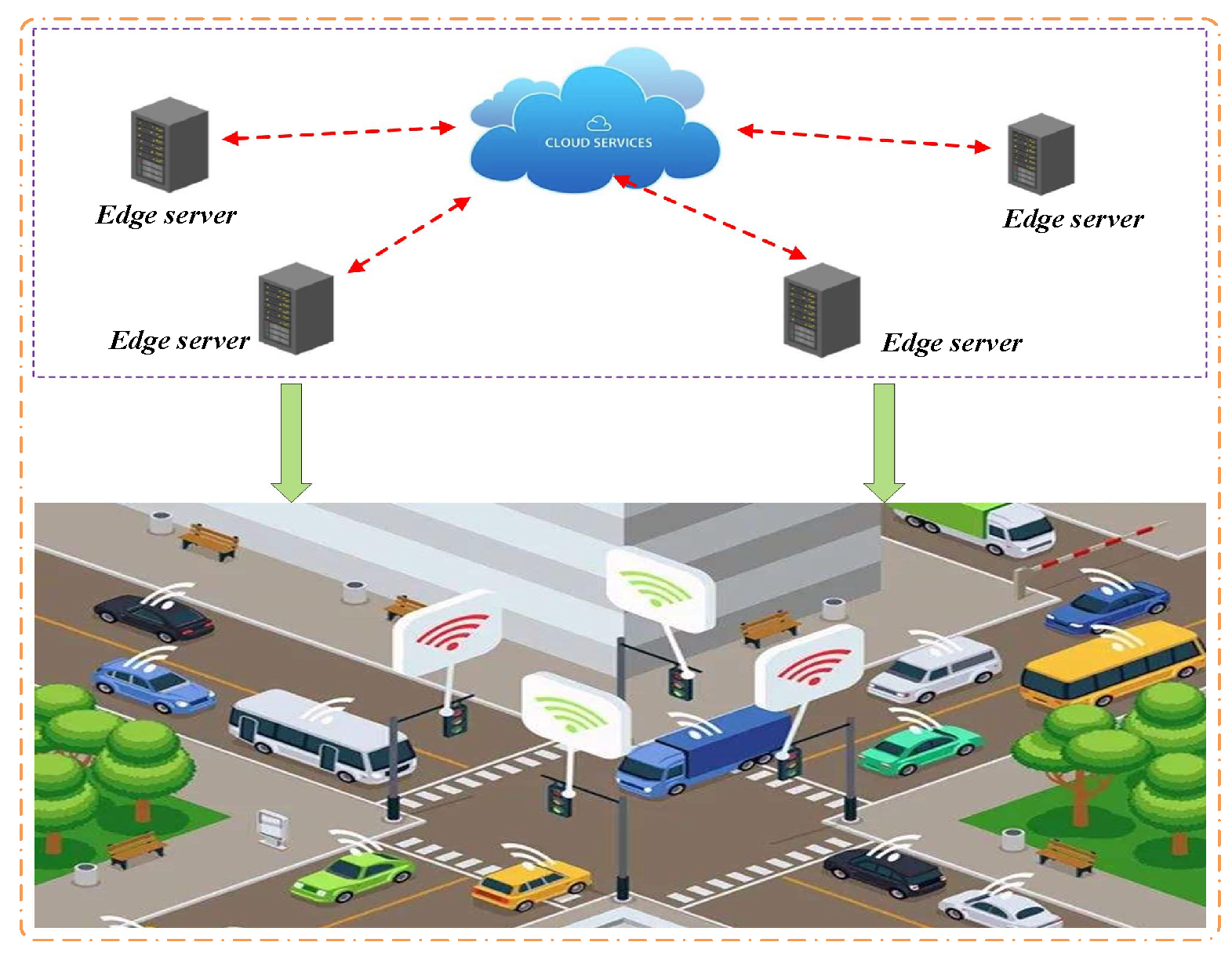

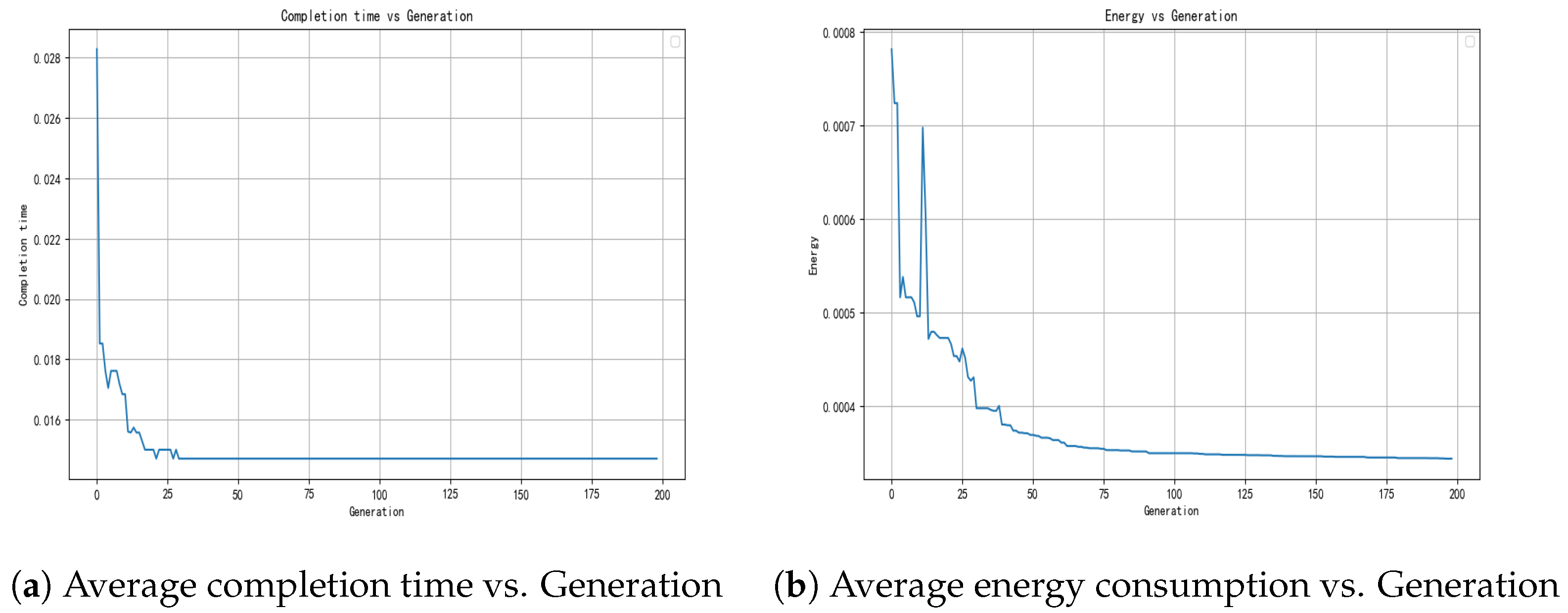
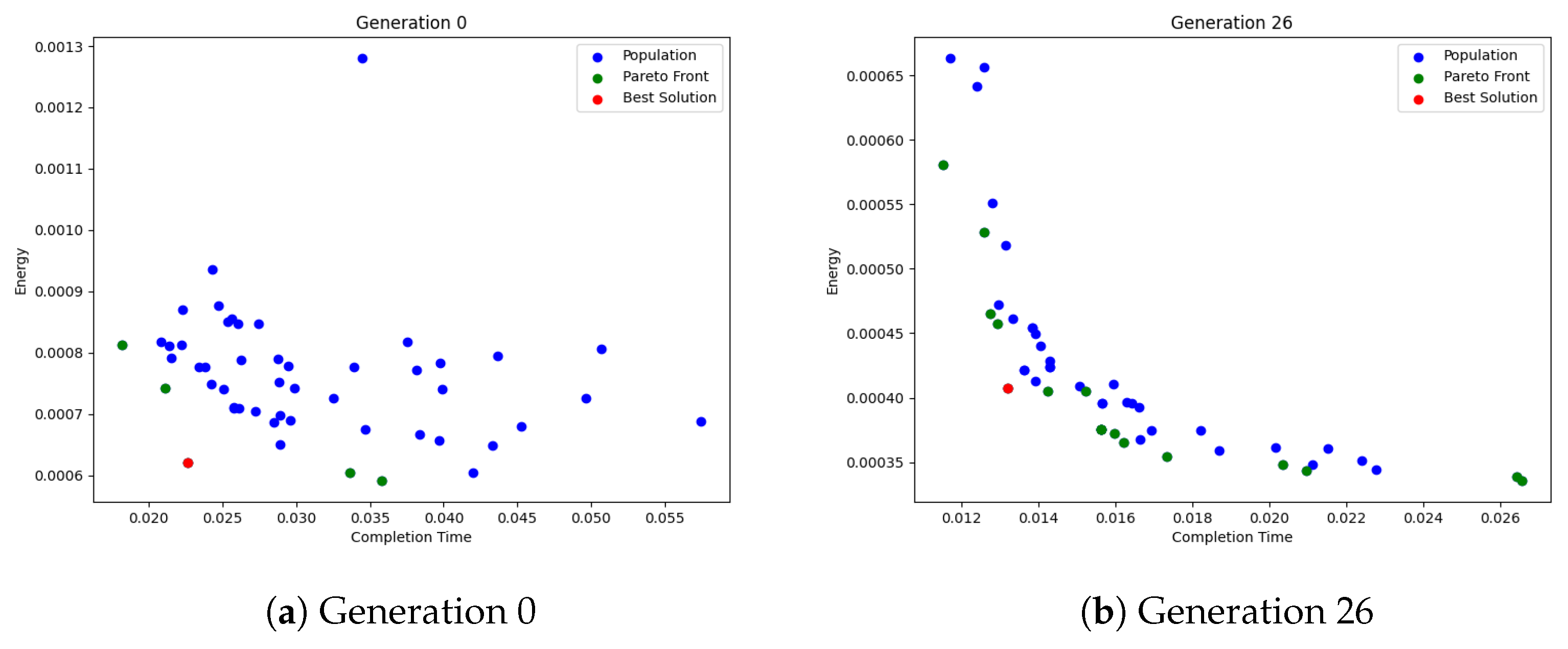

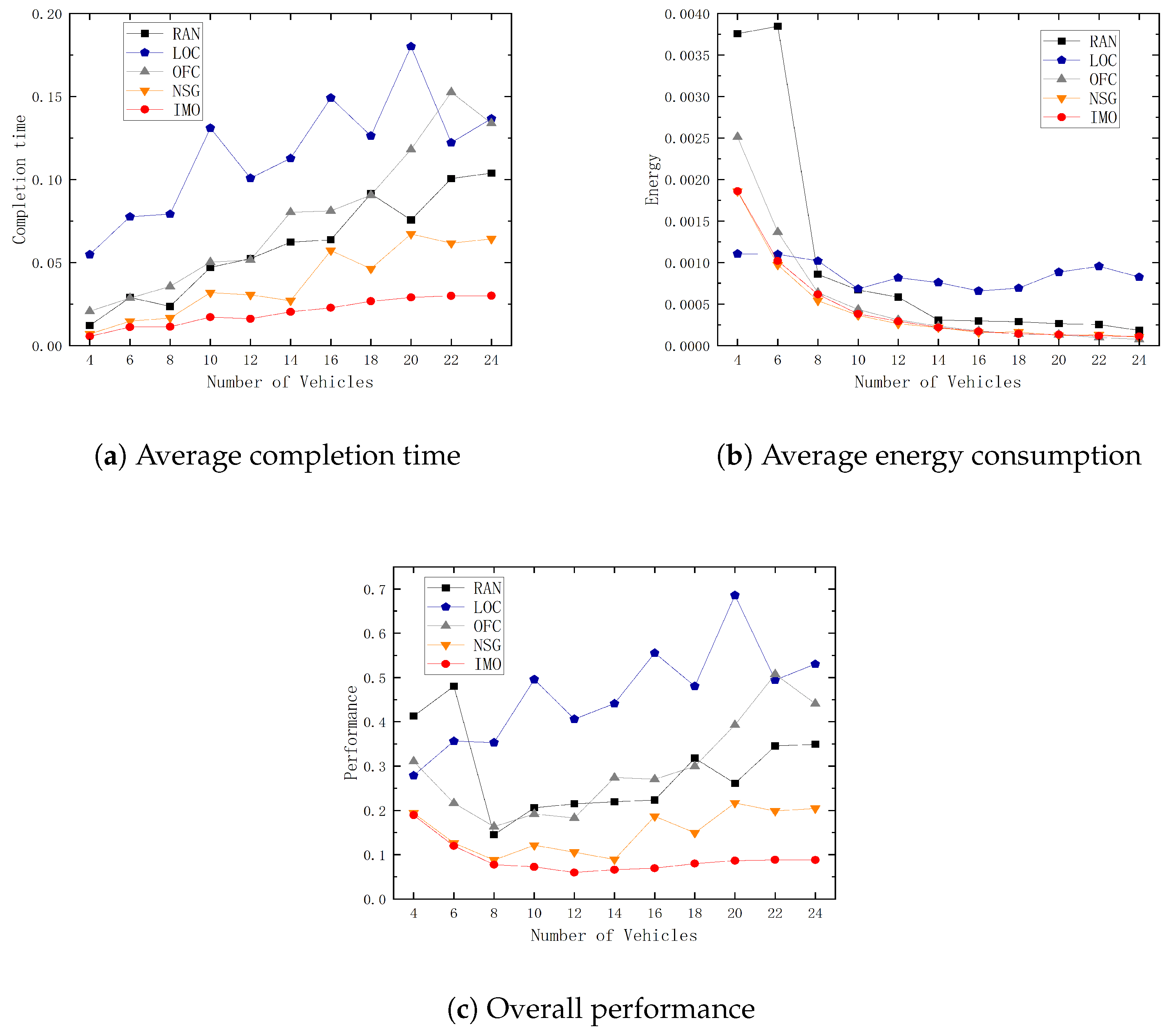

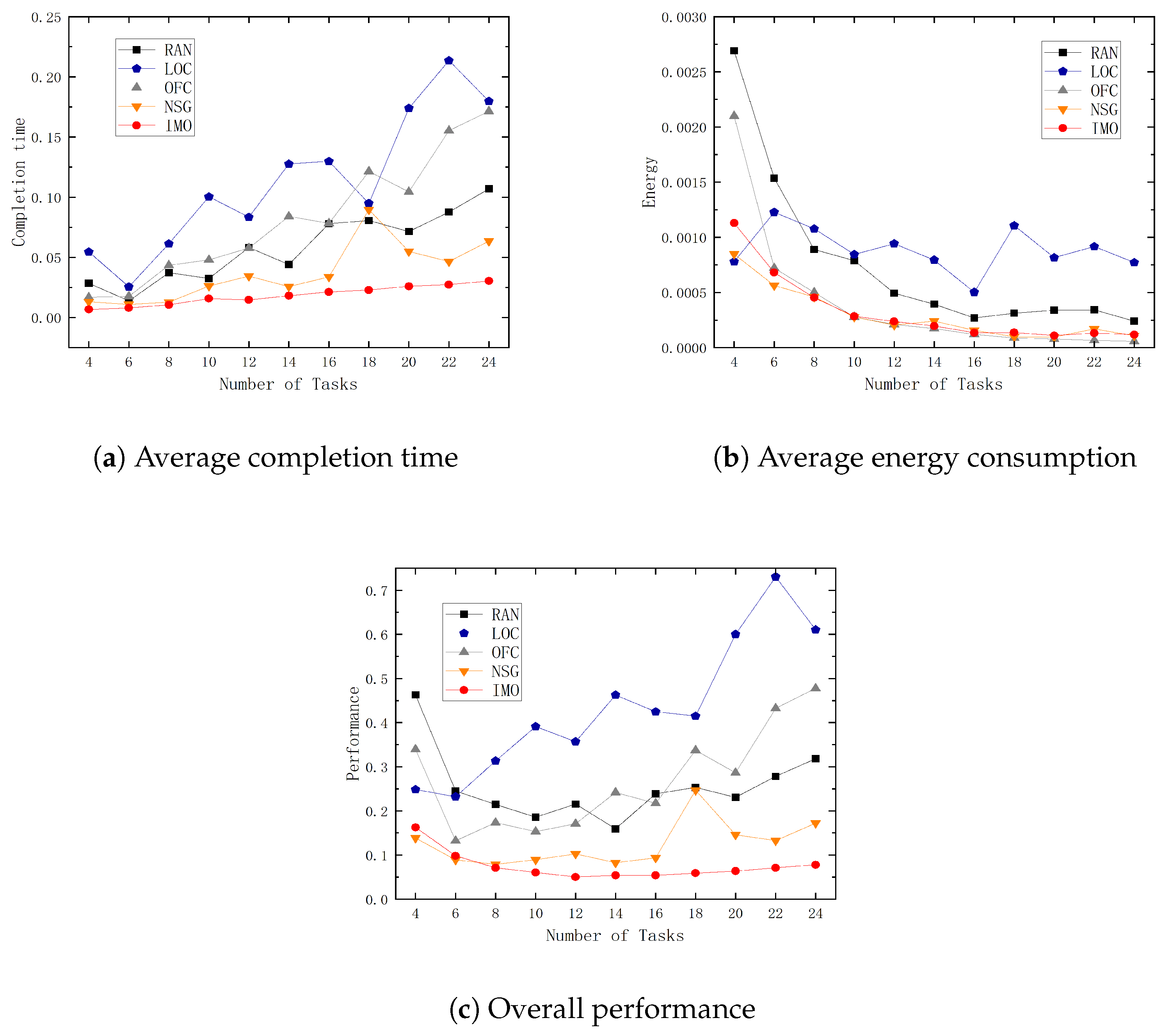
| Notation | Description |
|---|---|
| MEC-enabled medical vehicular network with a set V of medical vehicles, a set S of edge servers and a set E of links | |
| CPU capacity of medical vehicle | |
| CPU capacity of edge server | |
| j-th task generated by | |
| Data size of | |
| Maximum tolerant delay of | |
| Binary decision variable indicating whether is offloaded to | |
| Number of CPU cycles required to process a bit of task | |
| CPU resource allocated by to | |
| Data transmission rate of from to | |
| Transmission power of from to with the maximum threshold | |
| B | Transmission channel bandwidth |
| CPU resource allocated by to | |
| Local computation delay of | |
| Data transmission delay of from to | |
| Execution delay of on | |
| Offloading computation delay of on | |
| Computation delay of | |
| Local computation energy consumption of | |
| Transmission energy consumption of from to | |
| Computation energy consumption of on | |
| Offloading computation energy consumption of | |
| Total computation energy consumption of | |
| Local computation energy consumption coefficient of | |
| Computation energy consumption coefficient of |
| Parameter | Value |
|---|---|
| Number of medical vehicles | 2∼24 |
| Number of edge servers | 2∼8 |
| CPU of medical vehicle | [0.5 2 ] Hz |
| CPU of edge server | [2 2.2] Hz |
| Number of medical tasks | 4∼24 |
| Data size of medical task | [0.1 10] Byte |
| Maximum delay of task | [0.001 0.1] s |
| Path loss index | |
| Background noise power | |
| Transmission power of task | [ W |
| Transmission channel bandwidth | |
| Vehicle energy consumption coefficient | [ |
| Server energy consumption coefficient | [ |
| Population size | 100 |
| Maximum iteration times | 100 |
| Crossover probability | 0.5 |
| Mutation probability | 0.05 |
Disclaimer/Publisher’s Note: The statements, opinions and data contained in all publications are solely those of the individual author(s) and contributor(s) and not of MDPI and/or the editor(s). MDPI and/or the editor(s) disclaim responsibility for any injury to people or property resulting from any ideas, methods, instructions or products referred to in the content. |
© 2024 by the authors. Licensee MDPI, Basel, Switzerland. This article is an open access article distributed under the terms and conditions of the Creative Commons Attribution (CC BY) license (https://creativecommons.org/licenses/by/4.0/).
Share and Cite
Zhang, C.; Liu, S.; Yang, H.; Cui, G.; Li, F.; Wang, X. Joint Task Offloading and Resource Allocation in Mobile Edge Computing-Enabled Medical Vehicular Networks. Mathematics 2025, 13, 52. https://doi.org/10.3390/math13010052
Zhang C, Liu S, Yang H, Cui G, Li F, Wang X. Joint Task Offloading and Resource Allocation in Mobile Edge Computing-Enabled Medical Vehicular Networks. Mathematics. 2025; 13(1):52. https://doi.org/10.3390/math13010052
Chicago/Turabian StyleZhang, Chuangchuang, Siquan Liu, Hongyong Yang, Guanghai Cui, Fuliang Li, and Xingwei Wang. 2025. "Joint Task Offloading and Resource Allocation in Mobile Edge Computing-Enabled Medical Vehicular Networks" Mathematics 13, no. 1: 52. https://doi.org/10.3390/math13010052
APA StyleZhang, C., Liu, S., Yang, H., Cui, G., Li, F., & Wang, X. (2025). Joint Task Offloading and Resource Allocation in Mobile Edge Computing-Enabled Medical Vehicular Networks. Mathematics, 13(1), 52. https://doi.org/10.3390/math13010052






